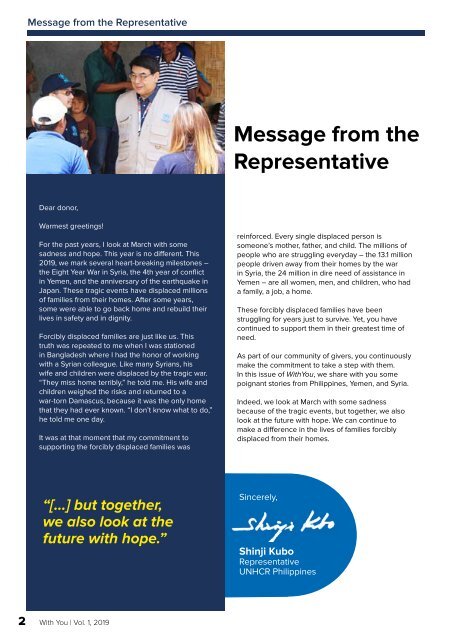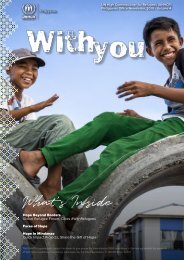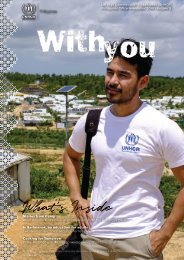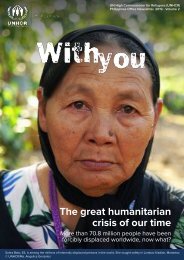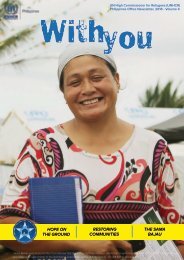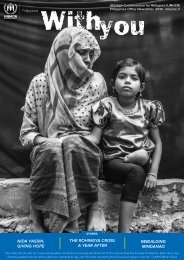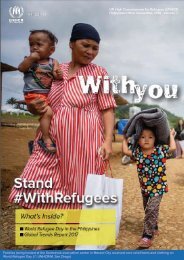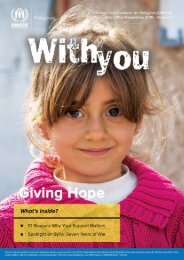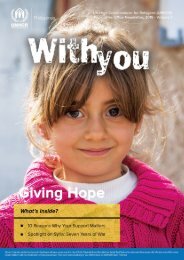With You, 2019 - Volume 1
Create successful ePaper yourself
Turn your PDF publications into a flip-book with our unique Google optimized e-Paper software.
Message from the Representative<br />
Special Feature<br />
Message from the<br />
Representative<br />
Dear donor,<br />
Warmest greetings!<br />
For the past years, I look at March with some<br />
sadness and hope. This year is no different. This<br />
<strong>2019</strong>, we mark several heart-breaking milestones –<br />
the Eight Year War in Syria, the 4th year of conflict<br />
in Yemen, and the anniversary of the earthquake in<br />
Japan. These tragic events have displaced millions<br />
of families from their homes. After some years,<br />
some were able to go back home and rebuild their<br />
lives in safety and in dignity.<br />
Forcibly displaced families are just like us. This<br />
truth was repeated to me when I was stationed<br />
in Bangladesh where I had the honor of working<br />
with a Syrian colleague. Like many Syrians, his<br />
wife and children were displaced by the tragic war.<br />
“They miss home terribly,” he told me. His wife and<br />
children weighed the risks and returned to a<br />
war-torn Damascus, because it was the only home<br />
that they had ever known. “I don’t know what to do,”<br />
he told me one day.<br />
It was at that moment that my commitment to<br />
supporting the forcibly displaced families was<br />
“[...] but together,<br />
we also look at the<br />
future with hope.”<br />
reinforced. Every single displaced person is<br />
someone’s mother, father, and child. The millions of<br />
people who are struggling everyday – the 13.1 million<br />
people driven away from their homes by the war<br />
in Syria, the 24 million in dire need of assistance in<br />
Yemen – are all women, men, and children, who had<br />
a family, a job, a home.<br />
These forcibly displaced families have been<br />
struggling for years just to survive. Yet, you have<br />
continued to support them in their greatest time of<br />
need.<br />
As part of our community of givers, you continuously<br />
make the commitment to take a step with them.<br />
In this issue of <strong>With</strong><strong>You</strong>, we share with you some<br />
poignant stories from Philippines, Yemen, and Syria.<br />
Indeed, we look at March with some sadness<br />
because of the tragic events, but together, we also<br />
look at the future with hope. We can continue to<br />
make a difference in the lives of families forcibly<br />
displaced from their homes.<br />
Sincerely,<br />
Shinji Kubo<br />
Representative<br />
UNHCR Philippines<br />
A Taste of Tomorrow<br />
Food is a way to nourish one’s self. A staple food offers<br />
a different meaning for the forcibly displaced women in<br />
a transitional shelter in Lanao del Sur.<br />
The palapa is a common side dish in Maranao cuisine.<br />
It is made out of ginger, coconut, onions, garlic, salt, and<br />
sakurab (a kind of shallot that only grows in cold areas).<br />
It is also a dish that unites the most vulnerable women<br />
and preserves the Maranao heritage. This dish is often<br />
used in Maranao cuisine to give viands a spicy kick. No<br />
household or eatery in Lanao Del Sur is seen without it.<br />
More than a side<br />
UNHCR Philippines helped turned this side dish into<br />
a hero for some internally displaced families. Through<br />
a quick-impact project, UNHCR was able to set-up<br />
Palapalicious, a livelihood project that trains and assists<br />
displaced women in the business of selling palapa.<br />
Founded in 2018, Palapalicious was a way for the<br />
internally displaced women to learn new skills, earn<br />
a living, and take a step to rebuilding their lives in<br />
safety and in dignity. It was also an avenue for the<br />
most vulnerable women having shared experiences of<br />
displacement form a safe community.<br />
“Kaming mga IDPs- mixed kami diyan, marami sa<br />
barangay shelter. Halo-halo kami. Nung magkakasama<br />
kami, masaya. Nagkakasayahan. Kung baga<br />
nagkaroon kami ng good friendship. Magandang<br />
samahan.” said Sania Naga, a internally displaced<br />
person and member of Palapalicious.<br />
It is because of continued commitment from donors<br />
and supporters that hope is restored to the women who<br />
have lost everything because of conflict. Through this<br />
quick-impact project, the displaced women were able<br />
to start a community among themselves and take a step<br />
towards building better futures.<br />
©UNHCR/ Ma. Angelica Gonzalez<br />
2 <strong>With</strong> <strong>You</strong> | Vol. 1, <strong>2019</strong> <strong>With</strong> <strong>You</strong> | Vol. 1, <strong>2019</strong> 3


